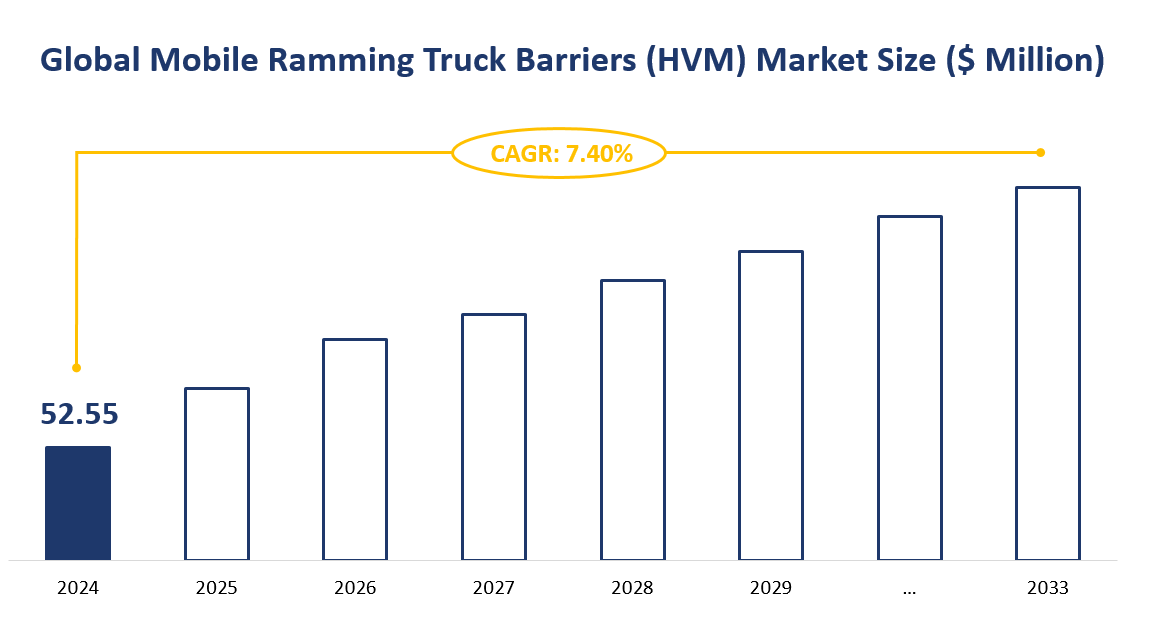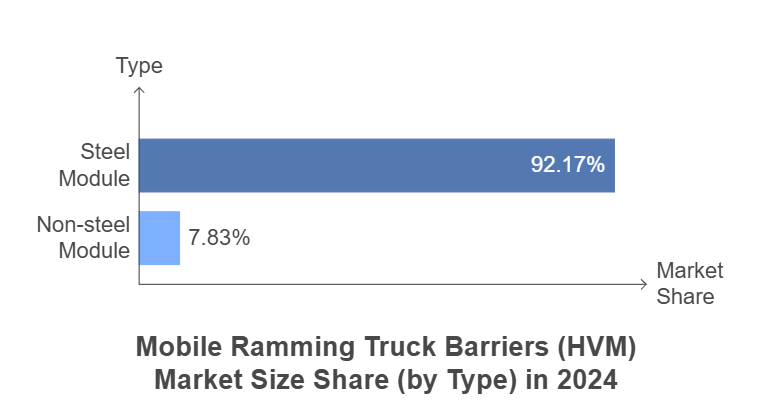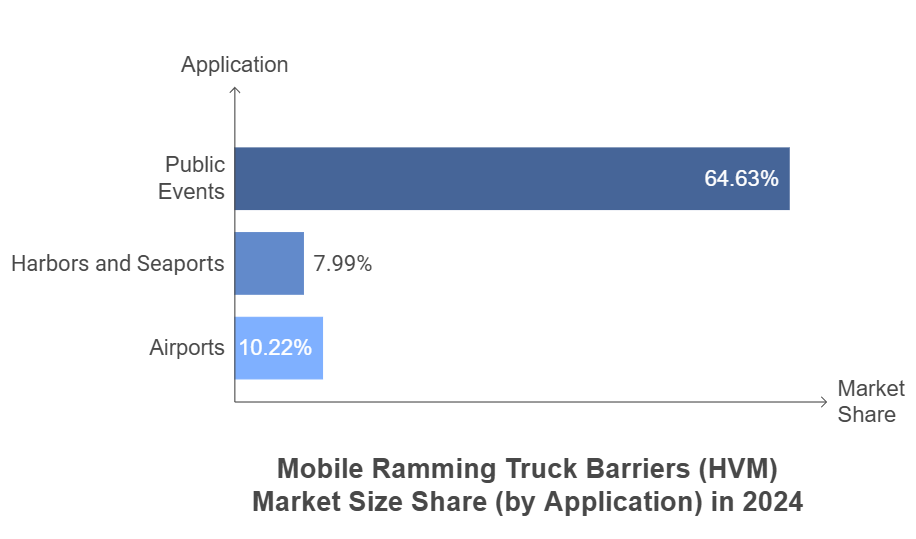1 Mobile Ramming Truck Barriers (HVM) Market Scope
The mobile ramming truck barriers (HVM) market is expected to grow rapidly in the coming years, with a CAGR of 7.40% from 2024 to 2033. In 2024, the total market value is forecasted to reach $52.55 million USD, showcasing a robust expansion in the industry. HVM, also known as Hostile Vehicle Mitigation barriers, are critical infrastructures designed to prevent vehicle-ramming attacks and ensure the security of public spaces and events.
Figure Global Mobile Ramming Truck Barriers (HVM) Market Size ($ Million) and CAGR (2024-2033)

2 Drivers and Constraints of the Mobile Ramming Truck Barriers (HVM) Market
The growth of the HVM market is influenced by several factors. One of the primary drivers is the increasing global terrorism threats and the need for enhanced security measures in public spaces. The rise in urbanization and the frequency of mass gatherings have heightened the demand for mobile and effective security solutions. Additionally, the growth in maritime trade and the expansion of airport facilities have led to a greater need for HVM to secure ports and airports. However, the market faces constraints such as the high initial investment required for the development and deployment of HVM systems, as well as the fluctuating raw material costs and labor expenses, which can impact the overall cost structure of the industry.
3 Global Mobile Ramming Truck Barriers (HVM) Market Analysis by Type
The global mobile ramming truck barriers market is segmented by type, with steel modules dominating the market due to their durability and effectiveness in withstanding impacts. In 2024, the steel module segment is projected to account for a market size of $48.43 million USD, reflecting a significant share of the total market. Non-steel modules, including aluminum, reinforced concrete, and plastic, are also used and are expected to reach a market size of $4.12 million USD in 2024. Steel modules are preferred for their ability to absorb damage rather than deflect it, quick installation, resistance to weather conditions, and low maintenance requirements. Non-steel modules offer alternatives for specific applications where weight or aesthetics are a concern.
In conclusion, the HVM market is set to expand significantly in the coming years, driven by the need for enhanced security measures and the continuous development of innovative technologies. Despite the challenges posed by initial investment costs and economic fluctuations, the market is expected to grow steadily, with steel modules maintaining their dominant position in the industry.
Table Global Mobile Ramming Truck Barriers (HVM) Market Size (M USD) (by Type) in 2024
| 2024 |
Steel Module | 48.43 |
Non-steel Module | 4.12 |
Total | 52.55 |
The steel module is expected to capture a remarkable 92.17% of the market share in 2024. This overwhelming preference for steel modules can be attributed to their superior durability, strength, and effectiveness in withstanding impacts. These characteristics are essential for security applications, where the primary goal is to prevent unauthorized access and ensure safety. Conversely, the Non-steel module category is projected to hold a smaller market share of 7.83%.
Figure Global Mobile Ramming Truck Barriers (HVM) Market Size Share (by Type) in 2024

4 Global Mobile Ramming Truck Barriers (HVM) Market Analysis by Application
The global mobile ramming truck barriers (HVM) market is set to witness a significant expansion in various application segments by 2024. Public Events, Harbors and Seaports, Airports, and Others are the primary applications driving the HVM market. In 2024, the Public Events segment is projected to lead with a market size of $33.96 million USD, reflecting the increasing need for secure public gatherings and mass events. The segment is expected to grow due to the rising number of global events and the demand for temporary and mobile security solutions that can be quickly deployed and dismantled.
Harbors and Seaports are anticipated to have a market size of $4.20 million USD in 2024, driven by the need to secure critical infrastructure against potential threats. Airports, another significant application, are expected to reach a market size of $5.37 million USD, attributed to the continuous investment in airport security and the need to protect against vehicle-borne attacks. The Others segment, which includes various other applications such as government facilities and military bases, is forecasted to have a market size of $9.02 million USD, highlighting the broad application of HVM in diverse security scenarios.
Table Global Mobile Ramming Truck Barriers (HVM) Market Size (M USD) (by Application) in 2024
2024 | |
Public Events | 33.96 |
Harbors and Seaports | 4.20 |
Airports | 5.37 |
Others | 9.02 |
Total | 52.55 |
The 2024 global mobile ramming truck barriers market showcases a dominant application in Public Events, capturing a substantial 64.63% of the market share. This indicates a critical need for temporary security solutions during mass gatherings. Airports follow, comprising 10.22% of the market, reflecting the significant investment in securing travel hubs against vehicle-borne threats. Harbors and Seaports account for 7.99%, underscoring the importance of protecting maritime infrastructure. The distribution emphasizes the pivotal role of HVM barriers in safeguarding high-risk areas, with public events leading the demand.
Figure Global Mobile Ramming Truck Barriers (HVM) Market Size Share (by Application) in 2024

5 Global Mobile Ramming Truck Barriers (HVM) Market Analysis by Region
The geographical segmentation of the global HVM market in 2024 reveals a diverse landscape with varying market sizes and growth potentials. North America is expected to dominate with a market size of $19.28 million USD, due to the region’s high investment in security infrastructure and the presence of key players in the HVM market. Europe follows with a market size of $20.16 million USD, driven by the region’s stringent security regulations and the need to protect critical infrastructure from potential threats.
The Asia Pacific region is projected to have a market size of $9.39 million USD, with growth attributed to the increasing security concerns in emerging economies and the expansion of public infrastructure. South America, though smaller in comparison, is expected to reach $1.08 million USD, with markets like Brazil and Argentina showing potential for growth. The Middle East and Africa are anticipated to have a market size of $2.64 million USD, with the region’s oil and gas industry driving the demand for HVM to secure critical assets.
Each region presents unique challenges and opportunities for the HVM market. North America and Europe, with their mature markets, focus on technological advancements and integration of HVM with smart security systems. The Asia Pacific region, with its growing economies, is a promising market for HVM manufacturers looking to expand their reach. South America, the Middle East and Africa, despite their smaller market sizes, offer opportunities for growth due to increasing security concerns and the need for robust security measures in the face of evolving threats.
In conclusion, the HVM market is poised for growth across various applications and regions, with public events and infrastructure security driving the demand. The market’s expansion is influenced by regional security needs, economic development, and ongoing investment in securing public spaces and critical infrastructure against vehicle-borne threats.
Table Mobile Ramming Truck Barriers (HVM) Segment Market Size (M USD) (by Region) in 2024
| 2024 |
North America | 19.28 |
Europe | 20.16 |
Asia Pacific | 9.39 |
South America | 1.08 |
Middle East and Africa | 2.64 |
Total | 52.55 |
6 Global Mobile Ramming Truck Barriers (HVM) Market Leading Companies
6.1 PITAGONE
PITAGONE, established in 2016, is a European leader in Counter Terror Mobile Solutions, serving Police, Armed Forces, Federal Agencies, Airports, Ports, and major private companies. With a presence in over thirty-five countries, PITAGONE offers tailor-made services and is headquartered in Brussels, Belgium. The F-11 and F-18 barriers are designed to stop vehicles even in hostile situations, with features like quick assembly and resistance to significant impacts.
In the last two years, PITAGONE has shown a revenue growth from $3.60 million in 2021 to $5.27 million in 2023, with gross margins ranging from 36.45% to 34.10%.
Table PITAGONE Mobile Ramming Truck Barriers (HVM) Revenue and Gross Margin 2021-2023
PITAGONE | 2021 | 2022 | 2023 |
Revenue (M USD) | 3.60 | 4.83 | 5.27 |
Gross Margin | 36.45% | 35.98% | 34.10% |
6.2 Mifram Security
Founded in 1962, Mifram Security is a multidisciplinary company with expertise in construction and security solutions. The company has been working with governments and international companies worldwide, offering a range of security barriers that utilize innovative technology. The HVM product of MVB 3X is a lightweight, easy-to-deploy barrier that stops heavy trucks and is certified by international standards.
Mifram Security’s revenue grew from $3.72 million in 2021 to $4.78 million in 2023, with gross margins fluctuating between 35.63% and 32.87%.
Table Mifram Security Mobile Ramming Truck Barriers (HVM) Revenue and Gross Margin 2021-2023
2021 | 2022 | 2023 | |
Revenue (M USD) | 3.72 | 4.38 | 4.78 |
Gross Margin | 35.63% | 34.65% | 32.87% |
6.3 Hörmann
Hörmann, established in 1935, is known for producing high-quality doors, frames, operators, and perimeter protection systems. With over 6000 employees across 40 factories worldwide, Hörmann provides security solutions for private and commercial properties.
Hörmann’s mobile vehicle blockers, like the OktaBlock, are certified and designed to prevent vehicle passage with a unique octagonal base for effective impact absorption.
Hörmann’s business revenue increased from $2.72 million in 2021 to $3.95 million in 2023, with gross margins ranging from 36.83-34.15%.
Table Hörmann Mobile Ramming Truck Barriers (HVM) Revenue and Gross Margin 2021-2023
2021 | 2022 | 2023 | |
Revenue (M USD) | 2.72 | 3.59 | 3.95 |
Gross Margin | 36.83% | 36.38% | 34.15% |





